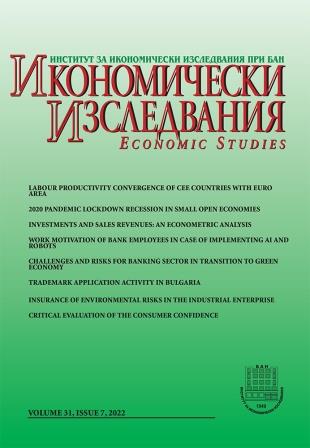Work Motivation of Bank Employees in Case of Implementing AI and Robots in the Bank Activities: Comparative Analysis of Russia and Kazakhstan
Work Motivation of Bank Employees in Case of Implementing AI and Robots in the Bank Activities: Comparative Analysis of Russia and Kazakhstan
Author(s): Vesselin Blagoev, Elena Shustova, Nina ProtasSubject(s): Economy, Business Economy / Management, Financial Markets
Published by: Институт за икономически изследвания при Българска академия на науките
Keywords: Work motivation; Hertzberg theory; motivators; Equity theory; Expectancy theory; intrinsic motivation; financial and non-material motivation; banking
Summary/Abstract: The dynamic changes in the banking industry as a result of the AI application and robotisation lead to substantial organisational changes and redefining the roles of bank employees. This, of course, has an impact on bank employees’ work motivation. In 2020-2021 the businesses, including banking, encountered one more influencing factor – the Covid-19 pandemic and related quarantine and lockdown measures, leading to forced move to remote work. This research aims to find out if the work motivation of the bank employees has changed, and if yes – in what directions.The analysis is based on the findings of a survey, conducted in the two countries in the period November 2020 – February 2021 and the results show some significant differences between the work motivation in the banking industry in the two countries. The questionnaire items target the main work motivation factors. Two working hypotheses were studied in this research: H1: The intensive implementation of AI in the banking sector positively affects the work motivation of bank employees in Russia and Kazakhstan. H2: The age of the employees matters for appreciation of the AI implementation, as younger employees 18-40 are more positive compared to employees beyond 40. H1 was confirmed, while H2 was confirmed regarding the difference in the opinions and motivation of the two age groups (under 40 and above 40 years of age), but not in regard to the appreciation of the changes by the two age groups.The main beneficiaries of the results of this research are the bank managers, both HRM and line managers, who are directly responsible for supporting the work motivation in the process of intensive implementation of AI and robotisation, e.g., chatbots, in the sector. It is also believed that the managers in the other sectors of the economy may benefit from these findings as well.
Journal: Икономически изследвания
- Issue Year: 2022
- Issue No: 7
- Page Range: 63-80
- Page Count: 18
- Language: English

